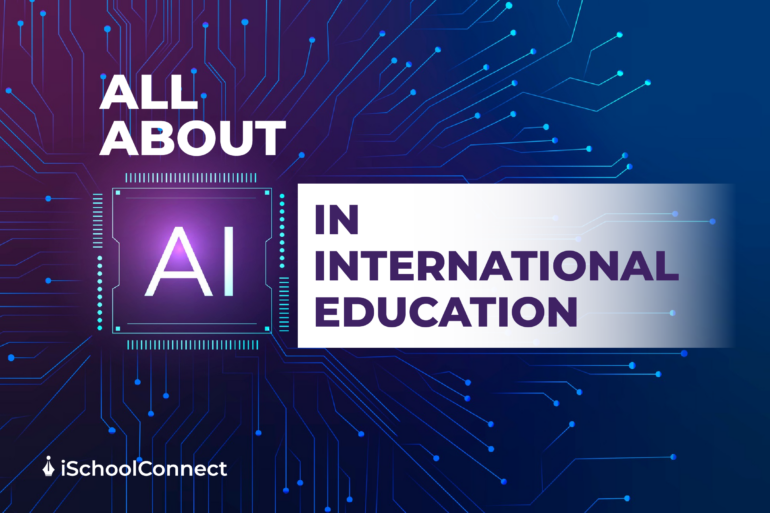Table of Contents
- Artificial Intelligence is transforming international education
- Personalized learning
- Adaptive learning systems
- Language learning and translation
- Virtual classrooms
- Student support and engagement
- Grading and assessment
- Predictive analytics for student success
- Curriculum development
- Data-Driven decision making
- Career counseling and placement
- Assessment and feedback
- Access to quality education
- Cultural adaptation and inclusivity
- Administrative efficiency
- Key takeaways
- FAQs
Artificial Intelligence is transforming international education
Artificial Intelligence (AI) is revolutionizing the landscape of international education, offering innovative solutions to enhance learning experiences, streamline administrative processes, and bridge gaps between diverse cultures. AI’s role in international education is multi-faceted, encompassing personalized learning, admissions and recruitment, language translation, virtual classrooms, data analysis, and more.Let’s understand the role of Artificial Intelligence in international education and how it is transforming the entire education system.
Personalized learning
One of AI’s key contributions is personalized learning. AI-powered platforms analyze students’ learning patterns and preferences to deliver customized content and learning pathways. This adaptive approach tailors education to individual needs, optimizing comprehension and retention. Through real-time feedback and targeted resources, students can engage with course materials in ways that suit their learning styles.
Adaptive learning systems
Personalized learning experiences that adjust to each student’s needs, preferences, and learning paces are made possible by adaptive learning systems, which combine AI and data analytics.These systems gather data on students’ interactions with learning materials, assessment performance, and other factors to tailor each student’s content and learning path. In the context of international education, adaptive learning systems can provide several benefits.
Language learning and translation
It also benefit from AI integration. Language barriers are overwhelmed with AI-driven translation tools, enabling students to access lectures and materials in their native languages. Additionally, AI-driven language learning apps offer interactive lessons and practice exercises, accelerating language acquisition for international students.
Virtual classrooms

AI-powered virtual classrooms facilitate global education by enabling seamless remote learning experiences. These platforms combine video conferencing, collaborative tools, and automated attendance tracking to create immersive virtual environments. Students and educators can interact in real-time, fostering cross-cultural interactions and borderless education.
Student support and engagement
AI-powered chatbots offer 24/7 student support, answering questions, providing information, and assisting with administrative tasks. This enhances student engagement and satisfaction. Also, AI identifies students who might be at risk of falling behind or dropping out by analyzing patterns in attendance, assignments, and performance. This enables educators to intervene early with the appropriate support.
Grading and assessment
AI-powered tools can automate the grading process for various assessments, including multiple-choice questions, true/false questions, and even some short-answer questions. These tools can quickly analyze and evaluate students’ responses, providing instant feedback and saving educators valuable time. AI-driven grading ensures consistent and objective evaluation, reducing potential bias that might arise from human graders.
Predictive analytics for student success
AI analyzes historical data to predict students’ performance and identify those at risk of dropping out. Institutions can intervene with appropriate support measures to improve retention rates. AI’s data analysis capabilities play a vital role in education by predicting student performance and enhancing retention strategies. By examining data, AI identifies patterns that indicate at-risk students. This enables institutions to intervene with targeted support, ensuring higher completion rates and overall student success.
Curriculum development

AI assists educators in developing curriculum and learning materials by suggesting relevant resources, aligning content with learning objectives, and generating content. AI-powered platforms analyze students’ learning patterns, preferences, and performance data to create personalized learning paths. This ensures that students receive content and assignments tailored to their needs, optimizing their learning experiences.
Data-Driven decision making
AI tools can gather and process large volumes of data from various sources, such as student records, academic performance, engagement metrics, and feedback. This comprehensive data collection provides a holistic view of student experiences and institutional performance. AI tools can also analyze global educational trends, demographic shifts, and labor market demands. This information assists institutions in developing programs that align with current and future needs.
Career counseling and placement
AI-powered career counseling tools assess students’ skills and interests, match them with potential career paths, and provide guidance on necessary steps to achieve their goals. AI can analyze vast amounts of data from various sources, including job markets, industries, and individual student profiles. This enables career counselors to provide data-driven insights about in-demand skills, emerging industries, and potential career paths to international students.
Assessment and feedback
Artificial intelligence can provide automated feedback on assignments and assessments, focusing on strengths and areas needing improvement and aiding in skill development. AI-powered systems can automatically grade assignments, quizzes, and exams, providing immediate feedback to students. This reduces the workload on educators and ensures consistent and objective grading. This AI-generated feedback can be provided to students, highlighting their strengths and suggesting areas for improvement. This helps students understand their mistakes and encourages continuous learning.
Access to quality education
AI enables remote and online learning, providing access to quality education for students in underserved or remote areas and those who cannot attend traditional classes. AI-powered platforms enable remote learning, making education accessible to individuals who might otherwise face geographical, financial, or logistical barriers. Students from different parts of the world can access quality education without the need to relocate. AI-driven translation tools break down language barriers, allowing students to learn in languages they are comfortable with. This is particularly valuable for international students studying a language that is not their native language.
Cultural adaptation and inclusivity
AI-driven tools offer international students cultural insights, advice, and resources, helping them adapt to new academic environments and cultural norms. AI can provide cultural insights to international students, helping them understand local customs, norms, and academic expectations. Chatbots and virtual assistants can guide etiquette, behavior, and social interactions. It can identify culturally relevant content and incorporate it into educational materials, making learning more relatable and engaging for international students.
Administrative efficiency
In the realm of admissions and recruitment, AI transforms the application process. Automated tools can verify documents, screen applications, and assess candidates based on preset criteria. Chatbots assist prospective students by providing instant answers to inquiries, guiding them through the application process, and fostering engagement. This efficient handling of administrative tasks enhances the overall experience for potential students.
Read more: Student Retention vs. Persistence Explained
Key takeaways
- Artificial intelligence transforms content creation and assessment processes. Educators can rely on AI to generate quizzes, assignments, and study materials, saving time for more meaningful interactions with students.
- Automated grading for multiple-choice questions and other assessments expedites the evaluation process while maintaining accuracy and consistency.
- The role of AI in international education is far-reaching and transformative. From offering personalized learning experiences to automating administrative tasks and enhancing language acquisition.
- AI has the potential to reshape how students engage with education on a global scale. However, while harnessing AI’s power, balancing its capabilities with ethical considerations and maintaining a human touch in education is essential.
Please share your comments below about this blog and let us know how this information has benefited you. For more details about scholarships and courses to study abroad, feel free to reach out to us by clicking here.
Liked this blog? Read next: Bentley University | A business education with a positive impact!
FAQs
Q1. Can AI replace teachers in international education?
Ans. While AI can automate certain tasks and provide support, it can’t replace the role of teachers in providing personalized guidance, mentorship, and the human touch essential for effective education.
Q2. How is AI used in online exams for international students?
Ans. AI can monitor online exams through facial recognition and behavior analysis to detect cheating attempts and maintain the integrity of the assessment process.
Q3. Are AI-powered language learning apps effective for international students?
Ans. Yes, AI-powered language learning apps offer personalized lessons, pronunciation practice, and instant feedback, making language acquisition engaging and effective for international students.






